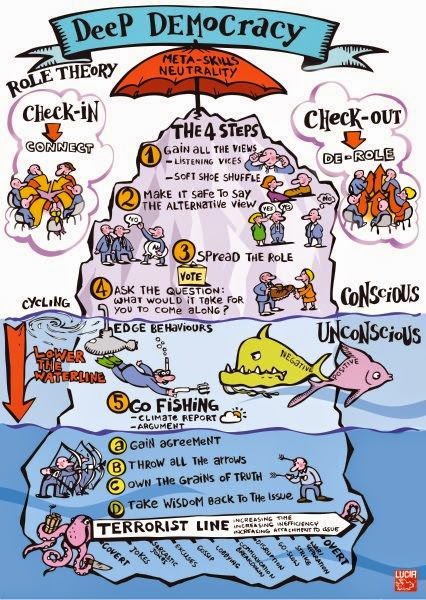Deep Democracy meets Scrum
About a year ago, I went to a training given by Sandra Bouckaert and Lydie van de Laar on the basics of Deep Democracy. My wife was 35 weeks pregnant and I was working on a project with worryingly limited financing so I was not exactly in the perfect 'zen' mindset for a day of mind-battering brainstorming. I expected to leave the day dazed and confused, yet found myself in the car buoyed up and even excited about what I had just experienced.
Deep Democracy is a method developed in South Africa at the end of the apartheid regime and specializes in getting minority views heard. It is concurrently a team-building tool and an ideation tool.
One of the things that keeps surprising me about Scrum Masters is the variance in in-depth knowledge when it comes to inter-personal processes, group processes, (personal- and team-) motivation and all the aspects that come with dealing with groups of humans. Scrum tells us things like: to have small teams, be servant leaders and have small increments of production. These are definitely good for people, but the foundation for these insights are not included in the Scrum Guide, with the well meaning idea that you should be free to choose your own tools but with the side-effect that some Scrum Masters start out with empty toolboxes.
So - here is an idea for a tool: Scrum meets Deep Democracy. I am developing this tool with Sandra Bouckaert, who is an expert in this field. I would suggest getting trained in Deep Democracy or finding someone who is already trained to avoid a half-baked product. This is just a description of what we are doing, it is not a DIY recipe!
9:00 - 9:15 Introduction of the Programme, the goals, the roles and the framework.
9:15 - 10:00 Check-In:
Product Owner pitches the product idea to the group
10:30 - 11:00 Soft Shoe Shuffle
A conversation about the central tennets of the product, at a really high level. For example, a pitch for a crowd-funding platform, could discuss 'I think that power to the masses.......'
11:00 - 12:00 Deep Democracy
Basic theory of Deep Democracy and the theory of the '4 steps' for decision-making.
12:00 - 13:00 Team Charter
Put the project goal, the team goal and individual goals on paper.
1 hour break
14:00 - 16:30 Product Backlog
Epics are outlined using User Stories and the '4 steps'.
16:30 - 17:00 Check-Out
Deep Democracy is a method developed in South Africa at the end of the apartheid regime and specializes in getting minority views heard. It is concurrently a team-building tool and an ideation tool.
Deep-Scrum Ideation
Unlike many of my Scrum Master compatriots, I don't come from a purely technical background. Besides being a web developer, I have worked as a sail-trainer since my teens and once studied social psychology with the misguided idea that this would help me to understand people's interaction and performance in groups.One of the things that keeps surprising me about Scrum Masters is the variance in in-depth knowledge when it comes to inter-personal processes, group processes, (personal- and team-) motivation and all the aspects that come with dealing with groups of humans. Scrum tells us things like: to have small teams, be servant leaders and have small increments of production. These are definitely good for people, but the foundation for these insights are not included in the Scrum Guide, with the well meaning idea that you should be free to choose your own tools but with the side-effect that some Scrum Masters start out with empty toolboxes.
So - here is an idea for a tool: Scrum meets Deep Democracy. I am developing this tool with Sandra Bouckaert, who is an expert in this field. I would suggest getting trained in Deep Democracy or finding someone who is already trained to avoid a half-baked product. This is just a description of what we are doing, it is not a DIY recipe!
Team:
The training is meant for a Scrum team, so including the Product Owner and Scrum Master. The training will probably be equally as beneficial to a new scrum team as a team that is already fully formed, stormed and normed.Usage:
This session covers the setting up of a team charter for a project and mapping out the Product Backlog, so at the kick-off/Sprint-0/Brainstorm of a project. Follow-up sessions could be used for Retrospectives and Sprint Planning - watch this space.The Need:
- Getting personal views and group processes that are inhibiting performance 'above the waterline'. These elements are often unconscious or invisible/hidden in traditional ideation methods.
- Tools for creative thinking and structuring ideas whilst collecting all views, opinions, visions and objections to the product idea.
- Removing personal and inter-personal blockages in the process as efficiently as possible to keep team goals central.
Programme:
One day, time-boxed a follows:9:00 - 9:15 Introduction of the Programme, the goals, the roles and the framework.
9:15 - 10:00 Check-In:
- Who are you?
- Where do you want to be at the end of the project?
- What are your expectations of today?
Product Owner pitches the product idea to the group
10:30 - 11:00 Soft Shoe Shuffle
A conversation about the central tennets of the product, at a really high level. For example, a pitch for a crowd-funding platform, could discuss 'I think that power to the masses.......'
11:00 - 12:00 Deep Democracy
Basic theory of Deep Democracy and the theory of the '4 steps' for decision-making.
12:00 - 13:00 Team Charter
Put the project goal, the team goal and individual goals on paper.
1 hour break
14:00 - 16:30 Product Backlog
Epics are outlined using User Stories and the '4 steps'.
16:30 - 17:00 Check-Out
- What did you think of the day?
- What was/wasn't useful?
- What is your thought on leaving?


Comments
Post a Comment